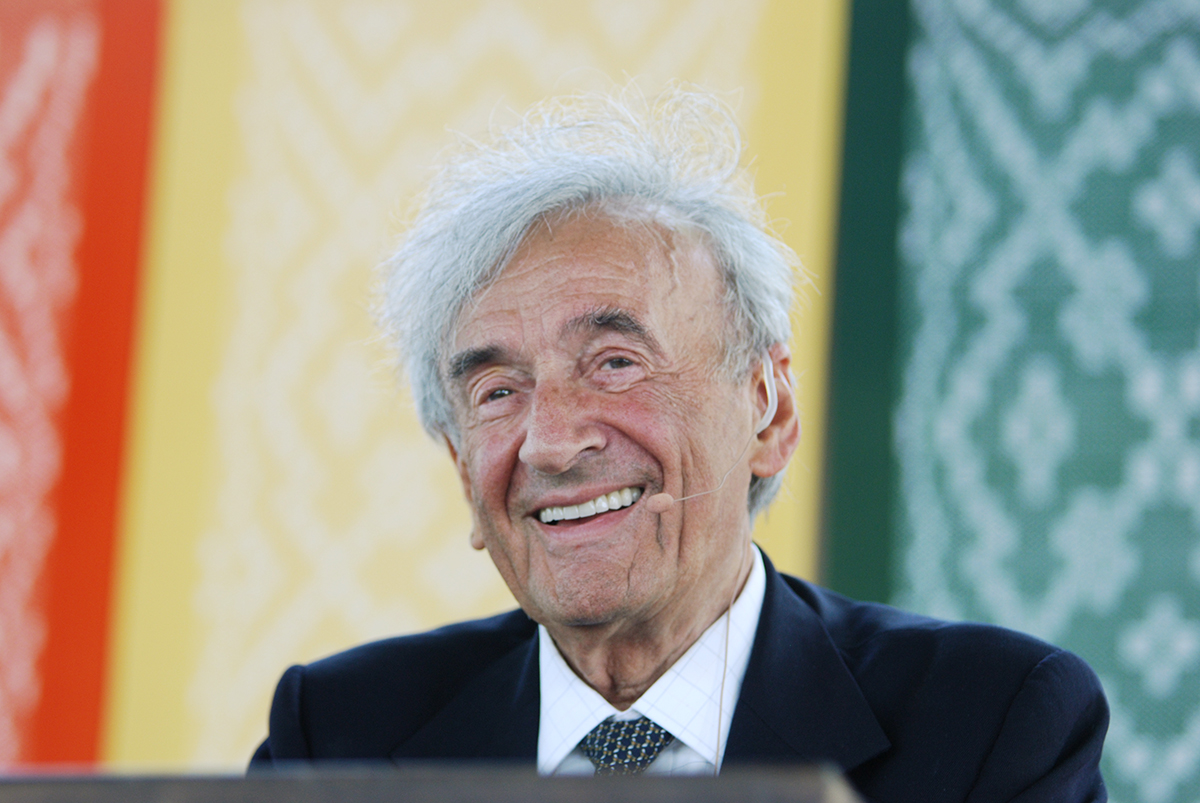Editor’s Note: As the world mourns the July 2 death of Nobel laureate Elie Wiesel, we looked back in our archives for news from the day Wiesel spent at Chautauqua in 2009. We also rediscovered this column, which Wiesel submitted to The Chautauquan Daily on June 23, 2009, in advance of his morning and afternoon lectures on Monday, July 27. (Wiesel keynoted that week, which carried the theme “What Makes Us Moral? An Abrahamic Perspective.”)
The column ran exactly seven years ago today, in the July 4 & 5, 2009, weekend edition. While Wiesel mainly references events specific to that time (hundreds of thousands of Iranians were protesting results of the 2009 Iranian presidential election), the overarching theme is no less relevant today. What better way to remember one of the giants of our time than by letting his words speak for themselves?
When you, reader, will see these words, the event that they describe may well have already been erased under the weight of changing current events.
I write them at a time when, in the distance, beyond borders and cultures, our humanity is glorified, but also threatened, in Iran.
Glorified it is by hundreds of thousands of young men and women who dare make their desire to live, sing and hope known under the flag of freedom. How can we not admire their civic courage and their need for political solidarity?
But on the other side, we see the militias, the police, the “Guardians of the Revolution,” armed as in the Middle Ages, from head to toe, wounding and sometimes killing protesters disappointed and betrayed by the system there.
And us here, in our blessed country, what are we doing to voice our support?
I ask this question, reader, because in my mind I already imagine myself before you in several weeks in the illustrious setting of the Chautauqua Institution lecture season.
And we will surely speak of ethical questions that confront our disoriented, careless, helpless society. To put it plainly, we all let things happen.
And how does morality fit in here?
Remember, in Tehran, things appear simple and clear: on one side, there is the dictator Mahmoud Ahmadinejad and his lies. On the other, “reformers” who defend the sanctity of the electoral vote. No doubt is allowed there. The whole world knows the truth. New elections are a must — as is a new regime. No one can forget the face of Neda, the young heroine assassinated in the street who became a modern martyr.
Who has shed tears for her tragic fate? Who has raised his or her voice, in the name of moral standards, to protect his or her brothers and sisters? To free prisoners of conscience? To tell the young rebels they are not alone?
Because the worst suffering inflicted on the victim, always and everywhere, is to think one has been abandoned, overlooked, forgotten in one’s prison cell or on one’s hospital bed. And if the individual that I am or that you are, dear reader, does nothing to say that he or she exists for us, that his or her freedom or happiness matters to us and preoccupies us, we end up on the loathsome side of immorality.
Isn’t that exactly what it means to make a moral choice? To not allow evil to overwhelm the heart and thoughts of its victim by depriving him or her of the right to hope? In my vocabulary, this step has a name: intervention.
Not easy? Ahmadinejad, I know. His tactics right now do not surprise me. I have led a campaign for a long time against him and his harmful politics. The number one Holocaust denier among us, he publicly declares his desire to acquire a nuclear weapon in order to destroy the Jewish state, thus to provoke a new Holocaust. How can we not believe in his sincerity? Someone like him, who is capable of killing so many of his own citizens … why would he not be in favor of taking the lives of countless Jews whom he considers his enemies?
No doubt other situations are more complex. Iraq, Afghanistan, the Israeli-Palestinian conflict: who is completely right, and who is entirely wrong? And where is the sublime ideal of peace in all this? What must we do, what can we sacrifice to see it finally come to an end? So that, for all sides, there would no longer be any orphans or widows? And misery? And the fierce gods of violence are once and for all disarmed?
Dear reader, these are all pertinent, pressing questions. Perhaps we will come back to them at the time of our next encounter.
They will not be resolved before then. Of this, I am convinced.
Translated from French by Jamie Moore, assistant to Elie Wiesel at Boston University.





